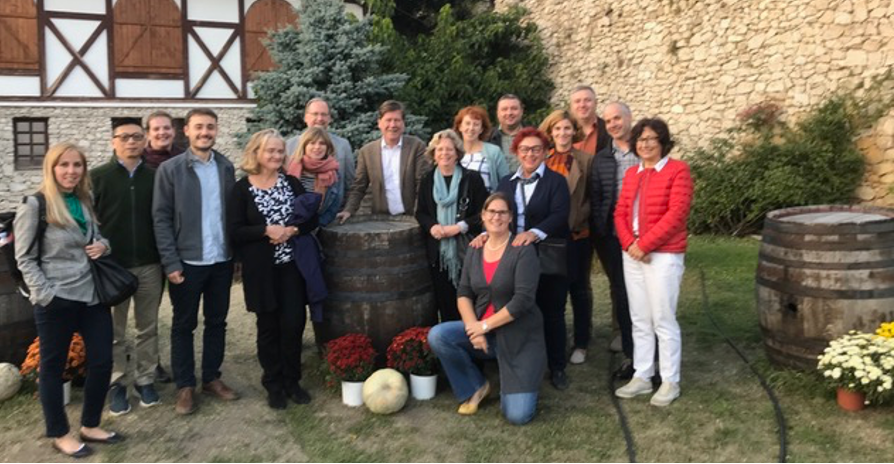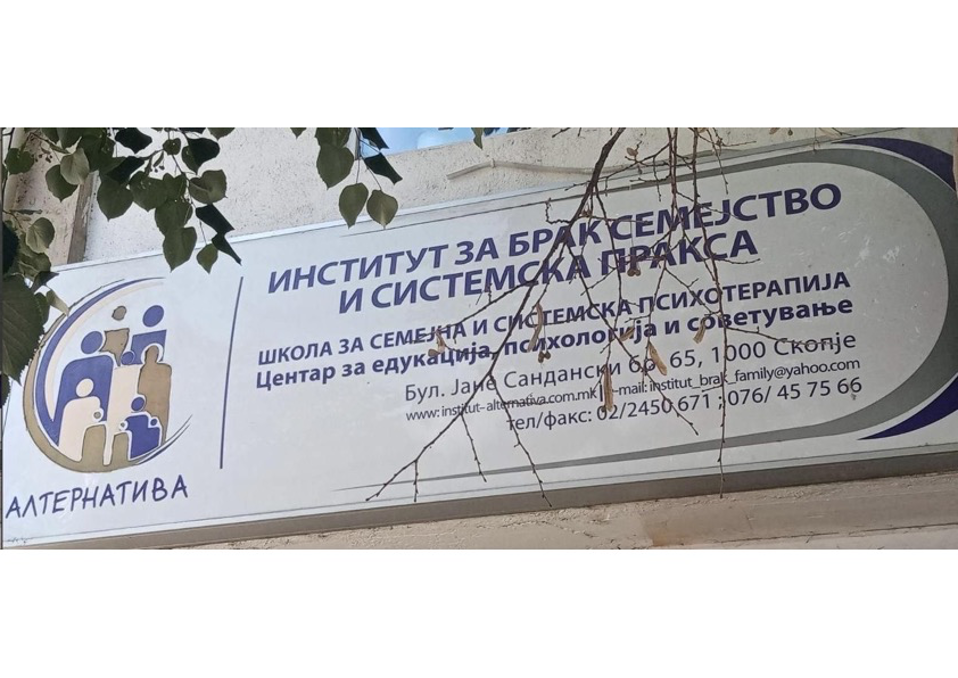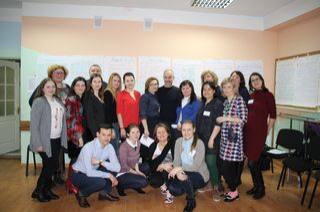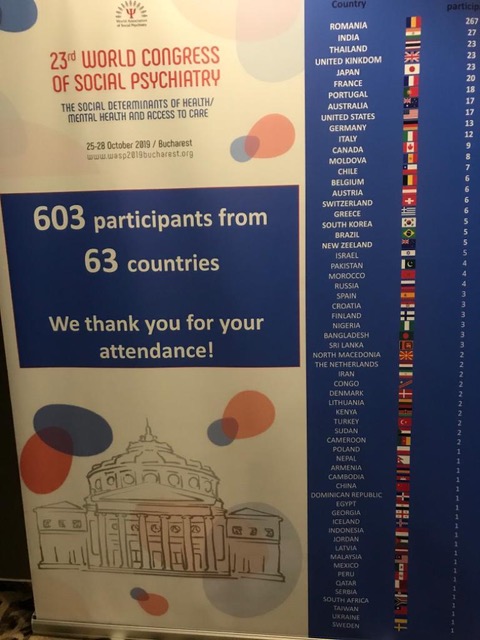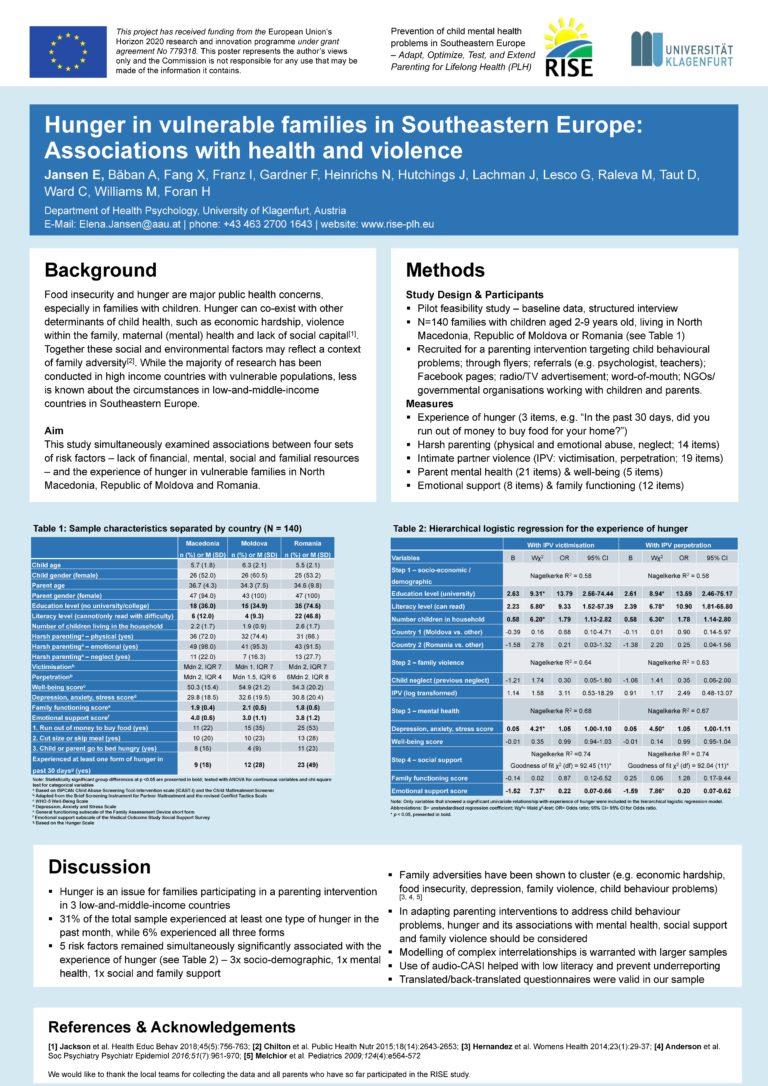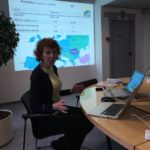Results
Phase 1
A new RISE paper has been published in Family Process. The article entitled “Preventing child mental health problems in southeastern Europe: Feasibility study (phase 1 of MOST framework)” describes the main Pre-Post results of the Feasibility study (Phase 1). The accepted version of the published article is available here: https://zenodo.org/record/5499718#.YTsXRC0Rqu4.
Phase 2
Results from Phase 2 indicated that the most cost-effective version of PLH for Young Children was five sessions delivered with basic engagement boosters (e.g., providing transport and childcare to assist parents in reducing barriers for participation) and supervision on demand for program facilitators. Investment in reducing more barriers and increasing incentives did not turn out to be cost-effective in these LMICs. This optimised version of the program is to be tested in the gold standard evaluation (a randomised controlled trial) in Phase 3 of the RISE project.
Phase 3
Because of restrictions on in-person meetings during the COVID-19 pandemic, the optimised program had to be delivered online (via Zoom, Teams and similar software) during Phase 3. In this randomised controlled trial, the program was compared with one group-based lecture on child development. Under these conditions, compared with the lecture, the program demonstrated small advantageous effects in key outcomes, including child mental health (oppositional defiant disorder and conduct disorder), when these were measured immediately after parents had received the program. At follow-up 12 months later, there was no difference in outcomes, except for parental stress, for parents who received the program and those who received the lecture. Parental stress was lower in the intervention group than in the lecture group at both the immediate and 12-month follow-up. We designed the lecture to be useful for parents (without specifically addressing child mental health), but some parents reported disappointment at not being allocated to the PLH condition.
Final Conclusion
We recommend a stepped-care approach to making parenting and child development information widely available to everyone, so that all parents can receive some information, and others who report higher levels of child behavior problems and parenting challenges receive longer, more intensive programs. Mechanisms for effectively supporting parents with challenges over the longer term, and finding low-cost solutions for sustainability – especially when using online delivery formats instead of in-person delivery – need further evaluation.
11 May 2022 - 13 May 2022
The final Consortium meeting will take place at Lake Ohrid, North Macedonia.
14 March 2022
The follow-up assessments of the randomized-controlled trial have been successfully completed in the three implementation countries.
20 January 2022
The EU Research & Innovation Magazine HORIZON mentions RISE in an article about the effects of the pandemic on child and youth mental health. The full article is available here:
And this is the video:
27 December 2021
Study Protocol article for the RCT published
The study protocol of the randomised-controlled trial (Phase 3 of RISE) was published in Trials. The peer-reviewed paper entitled “Prevention of child mental health problems through parenting interventions in Southeastern Europe (RISE): study protocol for a multi-site randomised controlled trial” is openly available here: https://trialsjournal.biomedcentral.com/articles/10.1186/s13063-021-05817-1.
02 December 2021
Start of Follow-up interviews for the RCT
Parents that participated in one of the parenting interventions (parent training, lecture on parenting) will be interviewed one last time to assess more long-term effects. In North Macedonia, the assessors started to contact the participants. Next, the follow-up assessments will also start in the other two implementation sites (Republic of Moldova and Romania).
24 September 2021
Post-assessments for RCT completed
The post-assessment interviews for the randomised-controlled trial (Phase 3) were successfully completed. In a next step, the families that participated in the parenting intervention will be interviewed for the follow-up assessment (planned for Winter 2021).
23/24 September 2021
RISE Consortium annual meeting
The RISE Consortium met for the annual meeting. The meeting specifically focused on the planning of dissemination activities. This includes peer-reviewed publications, conference presentations and dissemination activities in the three implementation countries to enhance widespread and sustained use of parenting support within existing systems.
07 September 2021
A new RISE paper has been published in Family Process. The article entitled “Preventing child mental health problems in southeastern Europe: Feasibility study (phase 1 of MOST framework)” describes the main Pre-Post results of the Feasibility study (Phase 1). The accepted version of the published article is available here: https://zenodo.org/record/5499718#.YTsXRC0Rqu4.
13 July 2021
Program delivery completed
The service delivery for the RCT has been completed: The last parent was conducted in Romania. The post-assessments are ongoing.
17 May 2021
Completion of recruitment for the RCT
The recruitment for the randomised-controlled trial has been successfully completed.
06 May 2021
Completion of program implementation in North Macedonia
In North Macedonia, the delivery of the parent groups (lecture and PLH) has been completed. In the other two implementation sites (Republic of Moldova and Romania), the program implementation is still ongoing.
29 March 2021
22 March 2021 - 26 March 2021
19 March 2021
https://www.frontiersin.org/articles/10.3389/fpubh.2021.581440/full
03 February 2021
Parenting for Lifelong Health (PLH) training for the RCT (Phase 3): The PLH booster training for the local coaches was successfully completed in the three implementation countries. In a next step, the local coaches will train the PLH facilitators in the local languages. Then, the facilitators will deliver the parent program to parents in the three countries North Macedonia, Republic of Moldova and Romania.
18 January 2021
The first pre-assessment of Phase 3 was completed in North Macedonia.
07 December 2020
We started the recruitment for Phase 3: the randomised-controlled trial.
02 December 2020
Data assessor training for Phase 3 pre-assessments has been successfully completed in Romania.
24 November 2020
We have received approval of the ethic amendment for Phase 3 (by the central ethic committee in Klagenfurt, Austria). We will start with recruitment for the randomised-controlled trial as soon as we will have the approval of the three local ethical committees in North Macedonia, Republic of Moldova and Romania. In the amendment, we have outlined a safety plan, in case parent groups will not be feasible due to local COVID-19 restrictions.
20 November 2020
Data coordinator trainings for Phase 3 have been successfully completed in North Macedonia, Republic of Moldova and Romania.
8th - 10th June 2020
10 Mai 2020
The follow-up assessments of Phase 2 have been successfully completed in the Republic of Moldova. Thus, data collection for the Factorial design (Phase 2) is now complete.
24 April 2020
CORDIS, a website of the European Commission (EC) has published an article about parenting during COVID-19 in six languages. The article is entitled “Survival tips for families struggling with the coronavirus crisis” and the CORIDIS journalists are citing the RISE project. Please find the News article here: https://cordis.europa.eu/article/id/415910-survival-tips-for-families-struggling-with-the-coronavirus-crisis?WT.mc_id=exp.
15 April 2020
March 2020
March 2020
Start of the follow-up assessments of Phase 2 in the Republic of Moldova.
March 2020
A team, led by PI Dr Jamie M Lachman, produced parenting resources during COVID-19. These are based on the Parenting for Lifelong Health and aim to support families to manage the restrictions under COVID-19. The tip sheets are available in many languages including Romanian, Russian and Macedonian (open-access: https://www.covid19parenting.com/tips-in-other-languages). A letter in The Lancet accompanied the release of these resources – https://www.thelancet.com/journals/lancet/article/PIIS0140-6736(20)30736-4/fulltext.
March 2020
23 March 2020
The RISE paper entitled “Hunger In Vulnerable Families In Southeastern Europe: Associations With Mental Health And Violence”. has been accepted for publication in Frontiers in Public Health. It will be available on Zenodo at the latest upon publication.
February 2020
Start of the follow-up assessments of Phase 2 in North Macedonia, Republic of Moldova and Romania.
November 22 - November 29 2019
The training for coding the facilitator videos has been successfully completed in North Macedonia, Republic of Moldova, and Romania. The coding of videos will be used to analyse the quality of delivery using the Parenting for Lifelong Health Facilitator Assessment Tool (PLH-FAT).
November 11 - November 15 2019
Principal Investigators Prof. Dr. Heather Foran and Dr. Jamie Lachman are presenting the RISE project at the GACD annual scientific meeting in Bangkok, Thailand (https://www.gacd.org/research/research-network/gacd-annual-scientific-meeting-2019)
October 29 - October 31 2019
The annual Consortium meeting takes place in Cluj, Romania from October 29 – October 31. The partners will discuss initial results of the Optimisation Study (Phase 2) and plan the randomised-controlled trial (Phase 3).
October 28 2019
A stakeholder meeting took place at in Bucharest (Romania) at the UNICEF building on October 28.
October 24 2019
The study protocol of phase has been published in Contemporary Clinical Trials. The article “Preventing child mental health problems through parenting interventions in Southeastern Europe (RISE): Protocol for a multi-country cluster randomized factorial study” by Lachman et al., is available via open-access: https://zenodo.org/record/3514745#.XcVDTS2ZOu4.
February 07 – March 01 2019
Facilitators and coaches were trained to conduct the PLH program in in Macedonia, Moldova and Romania for the Optimization Study (Phase 2). They were familiarized with the content and the materials.
February 2019
The first article from the RISE project about the study protocol of Phase 1 was published: Frantz, I., Foran, H.M., Lachman, J.M. … Heinrichs, N. (2019). Prevention of child mental health problems in Southeastern Europe: a multicentre sequential study to adapt, optimise and test the parenting programme ‘Parenting for Lifelong Health for Young Children’, protocol for stage 1, the feasibility study. BMJ Open. Please see: https://bmjopen.bmj.com/content/9/1/bmjopen-2018-026684
December 2018
Start of Recruitment for the Optimization Study (Phase 2).
November 2018
Post-assessments of the feasibility study in Macedonia, Moldova and Romania were successfully completed.
November 12 – 16, 2018
The project was presented at the congress GACD Annual Scientific Meeting and Implementation Science Workshop in São Paulo, Brazil. Heather Foran gave an oral presentation with the topic “Prevention of Child Mental Health Problems in Southeastern Europe – Adapt, Optimize, Test, and Extend Parenting for Lifelong Health (RISE)”.
October 8 – 11, 2018
Large project meeting in Chisinau (Moldova): Meeting of all principal investigators and the Data Safety and Monitoring Board (DSMB) to discuss the results of the feasibility study and to plan the next steps (optimization study).
September 2018
Post-assessments of the feasibility study are conducted in Macedonia, Moldova and Romania.
August 25 2018
Implementation of the feasibility study completed: The last session of the PLH for Young Children parenting program has been delivered. A total of 12 parenting groups have been conducted in Macedonia, Moldova and Romania (4 per country).
May 28 2018
The first session of the parent training „Parenting for Lifelong Health for Young Children“ has been conducted.
April 26, 2018
Start of Recruitment for the Feasibility Study (Phase 1).
Ethic Approval
The RISE project was approved by the Human Research Ethics Committee of the University of Klagenfurt, Austria, the Human Research Ethics Commission at the School of Medicine – St. Cyril and Methodius University Skopje, Macedonia, the Ethic Committee of Research of “Nicolae Testemitanu” State University of Medicine and Pharmacy of the Republic of Moldova, Chişinău and the Ethical Committee of Babes -Bolyai University, Cluj-Napoca, Romania.
12-16 March: Training of facilitators Macedonia
19-23 March: Training of facilitators Romania
25-29 March: Training of facilitators Moldova
The facilitators of each country were trained to conduct the PLH program. They were familiarized with the content and the materials. Moreover they discussed the schedule of the training sessions and were provided with the manual.
March 19 - 23, 2018 Romania
Training of the facilitators
February 20, 2018 Macedonia
February 23, 2018 Moldova
February 27, 2018 Romania
Inception meetings
This week the inception meetings take place in the Republic of Macedonia, the Republic of Moldova and Romania. The purpose of the inception meetings is to connect the stakeholders and the partner organizations. First, the stakeholders present their work in the field of family support. Then, an overview of the project and the Parenting for lifelong health program will be given. The meetings offer the opportunity to discuss the further procedure of the project and include a parent expert meeting.
January 15-16, 2018
Kick-off meeting
The Kick-off meeting of the project took place in the EU Liaison Office of the German Research Organisations (KoWi), Brussels, January 15-16, 2018. An internal work group meeting at the first day included an overview of work packages, presentations on Romania, Macedonia, and Moldova, and H2020 Financial Guidelines. The official Kick-off meeting at the second day started with a presentation by the project officer Dr. Anna Graca, who gave an overview of the Global Alliance for Chronic Diseases (GACD) initiative and mental health group as well as information on the expectations of the European Commission and main administrative aspects. Afterwards, the working group continued with the detailed planning for the next six months focussing on the upcoming ethic applications, the feasibility study as well as related tasks and deliverables.
 English
English
 French
French
 German
German
 Italian
Italian

